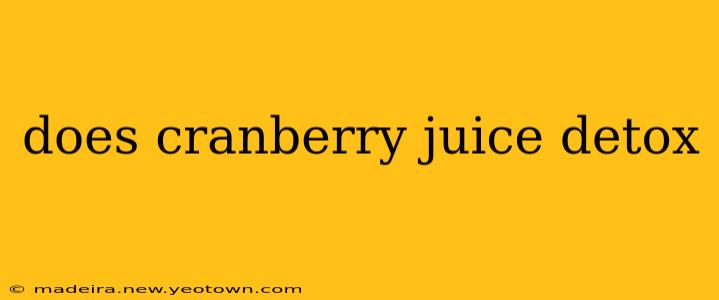The idea of a "detox" is alluring. We envision our bodies shedding unwanted toxins, leaving us feeling lighter, healthier, and more vibrant. Cranberry juice, with its vibrant color and tart flavor, often gets wrapped up in this detox narrative. But does cranberry juice truly detoxify the body? The answer, like most things related to health, is a bit more nuanced than a simple yes or no.
Let's delve into the science behind this popular belief and uncover the truth about cranberry juice and its role in our overall well-being.
What are the purported detoxifying effects of cranberry juice?
Many believe cranberry juice's purported detoxifying properties stem from its ability to help prevent urinary tract infections (UTIs). Cranberries contain compounds called proanthocyanidins (PACs), which prevent bacteria, particularly E. coli, from adhering to the walls of the urinary tract. This prevents bacterial colonization and reduces the risk of UTIs. Because UTIs involve the body's natural defense mechanisms fighting off infection, some interpret this as a form of "detoxification." However, this is a crucial point to clarify: preventing infection is not the same as removing toxins from the body in the generalized sense.
Does cranberry juice cleanse the liver?
This is a common misconception. While cranberry juice might indirectly support liver health by contributing to overall well-being and potentially reducing the risk of certain infections, it doesn't directly cleanse or detoxify the liver. The liver itself is a remarkably efficient detoxifying organ, and it performs this function effectively without the need for external aids like cranberry juice. Relying on cranberry juice for liver detoxification is misleading and could potentially delay seeking proper medical care if a liver issue arises.
Does cranberry juice help with kidney health?
Similar to the liver, the kidneys are naturally efficient at filtering waste and toxins from the blood. Cranberry juice does not directly cleanse or detoxify the kidneys. In fact, excessive consumption of cranberry juice, which is high in acidity and oxalates, could potentially contribute to kidney stone formation in susceptible individuals. Therefore, moderation is key.
Can cranberry juice help with weight loss?
Some believe that cranberry juice aids in weight loss. While cranberry juice is relatively low in calories compared to other fruit juices, it's not a magic weight-loss solution. A balanced diet and regular exercise are crucial for achieving and maintaining a healthy weight. Relying solely on cranberry juice for weight loss is unrealistic and could even be counterproductive if it replaces healthier food choices.
What are the potential downsides of excessive cranberry juice consumption?
Excessive consumption of cranberry juice can lead to several negative effects:
- Tooth enamel erosion: The high acidity of cranberry juice can erode tooth enamel over time, increasing the risk of cavities.
- Kidney stones: The oxalates in cranberry juice can contribute to kidney stone formation in some individuals.
- Medication interactions: Cranberry juice can interact with certain medications, affecting their effectiveness. It's vital to consult your doctor or pharmacist if you take any medications regularly.
- High sugar content: Many commercially available cranberry juices are high in added sugar, leading to potential health issues like weight gain and increased risk of type 2 diabetes.
Conclusion: The Reality of Cranberry Juice
Cranberry juice, while offering some health benefits related to urinary tract health thanks to its PACs, isn't a "detox" drink in the way many people believe. Our bodies possess natural detoxification mechanisms; relying on a single juice to perform this function is inaccurate. Moderation and a balanced lifestyle remain the cornerstone of overall well-being. Always consult your doctor or a registered dietitian before making significant changes to your diet, especially if you have underlying health conditions.

